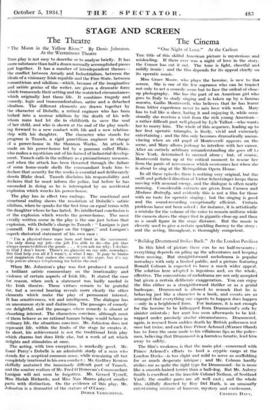STAGE AND SCREEN The Theatre
‘• The Moon in the Yellow River." By Denis Johnston. At the Westminster Theatre THIS play is not easy to describe or to analyse briefly. It has more substance than half a dozen normally accomplished pieces
put together. It has a number of interdependent themes— the conflict between Arcady and. Industrialism, between the
ideals of a visionary-Irish republic and the Free State, between romanticism and nihilism—which, because of the imaginative
and satiric genius of the writer, are given a dramatic force which transcends their setting and the restricted circumstances which originally lent them life. It combines tragedy and comedy, logic and transcendentalism, satire and a detached idealism. The different elements are drawn together by the character of Dobelle, a retired engineer who has been locked into a morose nihilism by the death of his wife whom nuns had let die in childbirth to save the soul of her child, and who is shown at the end of the play reach- ing forward to a new contact with life and a new relation- ship with his daughter. The character who stands for progress is Tausch, a rigid punctilious engineer in charge of a power-house in the Shannon Works. An attack is made on his power-house led by a gunman called Blake, who makes a mysticism out of his hatred of industrial develop- ment. Tausch calli in the military as a Precautionary measure, and when the attack has been thwarted through the failure of some home-made shells the commandant leads him to declare that security for the works is essential and deliberately shoots Blake dead. Tausch disclaims his responsibility and declares that he must inform the police, but before he has succeeded in doing so he is interrupted by an accidental explosion which wrecks his power-house.
The play has in effect two endings. The emotional and structural ending shows the resolution of Dobelle's satiric nihilism, when he speaks for the first time on equal terms with the daughter whom he has hated. Its intellectual conclusion is at the explosion which wrecks the power-house. The most vividly written scene in the play is the one just before that explosion, with Dobelle's charge to Tausch : "-Lanigan is just yourself. He is your finger on the trigger," and Lanigan's superb. rhetorical. statement of his own case :
" I'm. a physical-force man born and bred in the movement. I'm only doing my job—the job I'm able to dO—the job that always seemsto deliver the goods . . . if you ask me why, I declare to God I don't know. There's no glamour on my side, nowadays. But God help you all if I wasn't, is what. I say. It play be brains and inspiration that makes the country at the start, but it's my help you're always telephoning for before the end."
When Mr. Johnston's play was first produced it seemed a brilliant satiric commentary on the irrationality and violence, of certain aspects of Irish life. • It, stated the case
for.. reason, when such a statement was badly needed in the Irish theatre. These virtues remain to be grateful for, but a second hearing reveals more clearly the other elements which make the play of permanent interest. It has sensitiveness, wit and intelligence. The dialogue has an uncommon style and distinction. The passages of comedy are delightful, and the passages where comedy is absent of absorbing interest. The characters convince, although most of them behave as no rational human beings would behave in ordinary life, the situations convince. Mr. Johnston does not represent life, within the limits of the stage he creates it. In short, his achievement is not the traditional Irish play
which charms but • does little else, but a work of art which delights and stimulates at once.
The acting, with two exceptions, is markedly good. Mr.
Esme- Percy's Dobelle is an admirable study of a man who stands for a sceptical common sense, while remaining all but completely irrational in his own conduct ; Mr. Godfrey Kenton skilfully sustained the immensely difficult part of Tausch, and the sombre realism of Mr. Fred O'Donovan's Commandant Lanigan will not soon be forgotten. Mr. Geraid Tyrrell, Miss Shelah Richards, and Miss Nan Munro played smaller parts with -distinction. On the evidence Of this play, Mr. Johnston is a dramatist of the stature of &Casey.
DEREK VERSCHOYLE.










































 Previous page
Previous page